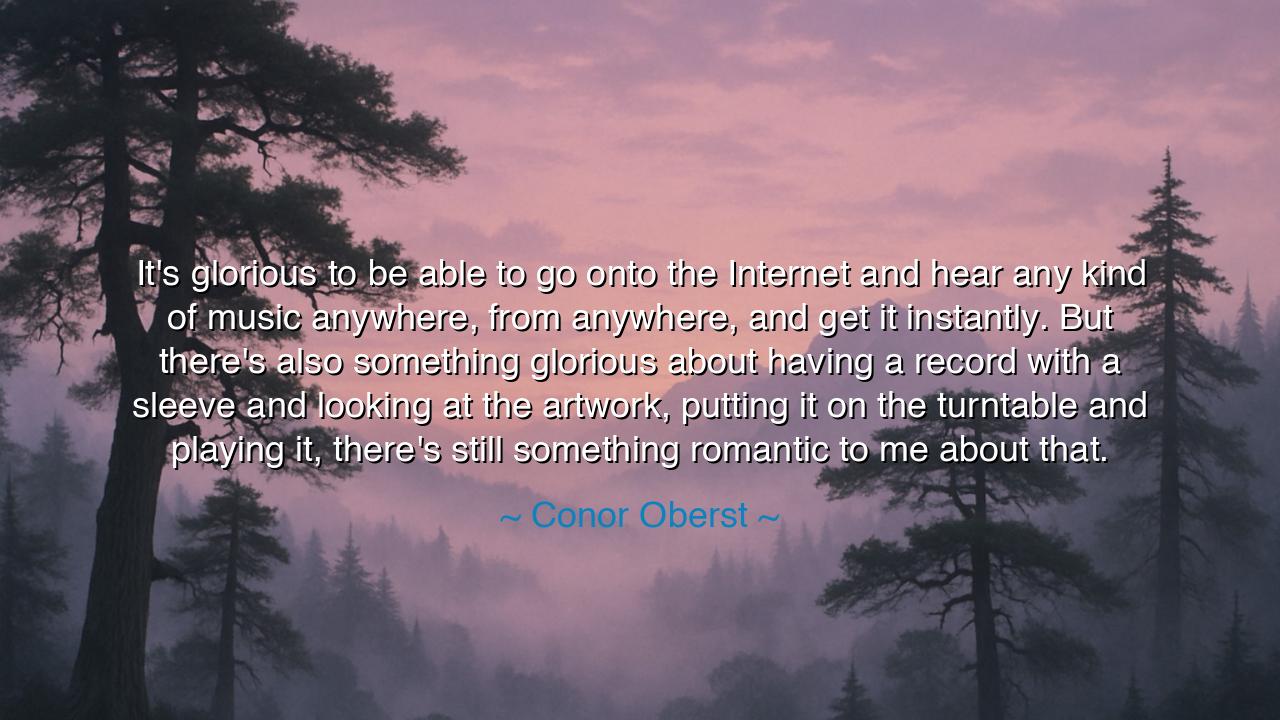
It's glorious to be able to go onto the Internet and hear any
It's glorious to be able to go onto the Internet and hear any kind of music anywhere, from anywhere, and get it instantly. But there's also something glorious about having a record with a sleeve and looking at the artwork, putting it on the turntable and playing it, there's still something romantic to me about that.






Listen, O children, to the words of Conor Oberst, whose reflections on the old and new ways of experiencing music reveal a profound truth about connection, nostalgia, and the human spirit. He said, “It’s glorious to be able to go onto the Internet and hear any kind of music anywhere, from anywhere, and get it instantly. But there’s also something glorious about having a record with a sleeve and looking at the artwork, putting it on the turntable and playing it, there’s still something romantic to me about that.” In these words, Oberst captures the tension between the world of instantaneous access—the digital age—and the deeply personal, tangible experience of listening to music, a ritual steeped in history and memory. His reflection speaks not just of music, but of the way we experience all aspects of life, the balance between immediacy and the romanticism of the past.
In the ancient world, there was no rush for instant gratification. When the bards told their stories, the music of the lyre or the flute was played live, and the experience was not just auditory but immersive—the listener became part of the moment. The process of waiting for the performance, of savoring the experience as it unfolded, was an act of patience and connection. Music was something that required time, that was meant to be shared in person, and the act of listening was an act of communion between artist and audience. The song was present, and the moment could not be rushed, for the music lived only in that fleeting moment. Oberst’s words draw upon this romantic notion, where music was more than a commodity—it was a living, breathing thing, shared with those who were willing to dedicate themselves to its experience.
Consider the story of Homer, the ancient poet who, like the bards of old, recited his epic tales not through a device or a recording, but through his voice and presence. The Iliad and the Odyssey were not just stories—they were shared experiences that were passed down through generations, each telling of the stories more than just the words. The experience of hearing the tales—standing there, listening with the community—was part of what made the story so powerful. The experience was tangible, the space filled with the weight of history, of shared humanity. This is what Oberst longs for in his quote: the physicality of music, the ritual of turning the record, the presence of the album cover. These are not mere accessories; they are the very essence of the connection between artist and audience, between the now and the past.
In contrast, the digital age, for all its convenience, often lacks the ritual. The Internet allows us to listen to any song, at any time, from any place, but the experience of hearing it is often fleeting, disconnected from the physical world. The romanticism Oberst speaks of is not just about the act of listening to music, but about the entire experience—the anticipation of unwrapping the record, the careful act of placing it on the turntable, and the momentary escape into the world of music that is tied to the physical act of listening. In this, Oberst touches on a deeper truth: there is something sacred in the act of slowing down, of engaging with the world in a more intentional way.
The lesson here, O children, is not that the digital world is wrong, or that the past is better, but that we must learn to find balance. In our rush for instant gratification, we often lose sight of the importance of the ritual, of the process that allows us to connect more deeply with the world around us. In every part of life, there is value in slowing down, in stepping back and immersing ourselves in the experience. Whether in music, art, or even the simple acts of conversation or reflection, there is wisdom in taking the time to truly be present. The digital world may offer convenience, but it is the slow moments, the rituals of the past, that give our experiences depth and meaning.
Consider, O children, how even in ancient times, people knew the value of rituals. The Greeks, for example, performed their sacrifices to the gods not just for the offering, but for the ritual itself, for the time spent in prayer and reflection, for the sacred nature of the act. Slowness and intention created a space where meaning could be found, where each action became imbued with greater significance. Just as the Greek rituals connected them to the divine, so too do the small rituals of modern life—whether it is listening to an album on vinyl, sharing a meal with loved ones, or taking time to reflect—bring us closer to the sacred in the world.
Thus, O children, I say unto you: Do not rush through life in search of convenience alone. The world may offer you instant gratification, but it is in the slower moments, in the rituals of life, that you will find the true depth and meaning of your existence. Like the Romantic poets or the ancient Greeks, embrace the beauty of the moment, of the act, and of the connection. Whether you are listening to a song, creating art, or simply living, find the romance in the process, in the act of truly engaging with the world around you. In this, you will discover that the meaning of life is not in how quickly you can access it, but in how deeply you can experience it.






AAdministratorAdministrator
Welcome, honored guests. Please leave a comment, we will respond soon